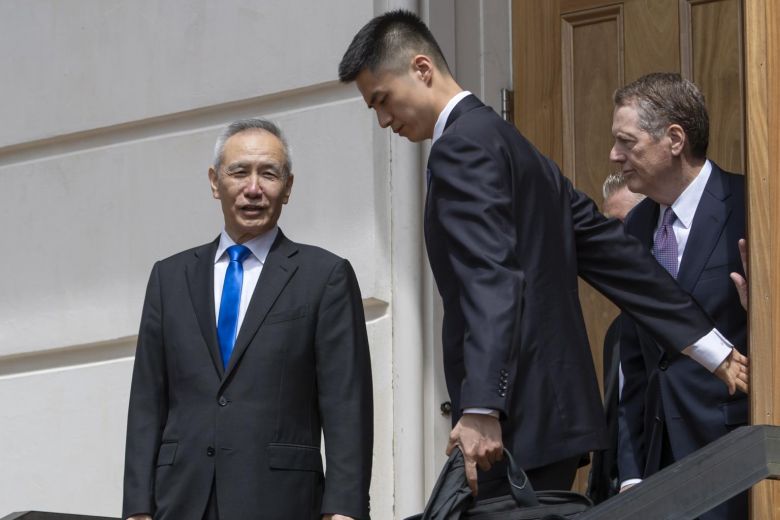US-China trade impasse: Three stumbling blocks in way of a deal, says Vice-Premier Liu He

China Vice-Premier Liu He (left) says goodbye to US Trade Representative Robert Lighthizer (right) after trade talks at the offices of the US Trade Representative in Washington on May 10, 2019.PHOTO: EPA-EFE
BEIJING, May 11, 2019, The Straits Times. Three issues lie in the way of an agreement between China and the United States, which will have to be ironed out in upcoming talks in Beijing, China’s chief trade negotiator said as Washington moved to impose higher tariffs on Chinese goods, reported The Straits Times.
Spelling out for the first time what the conflicts were, Vice-Premier Liu He maintained that negotiations have not broken down, even though his meeting with US Treasury Secretary Steven Mnuchin and US Trade Representative Robert Lighthizer ended just after 90 minutes.
In an interview after talks wrapped up on Friday (May 10) in Washington, Mr Liu told Chinese media that while a consensus was reached over many issues, the two sides could not see eye to eye on three others: China’s demand for the US to remove all additional tariffs; the target set by the US on goods purchased by China; and the wording of the agreement’s text.
Chinese purchases of US goods should be matched by real demand, said Mr Liu, while China seeks an agreement that is “equal and dignified”.
The disagreements were over matters of principle, he noted.
“Every country has its principles, and we cannot give in,” he said.
Mr Liu also said that China strongly opposes the US move to raise tariffs, which does not help resolve the dispute and compels China to retaliate.
“As a country, if the US increases tariffs, we must react. We hope they will act with restraint, and so will we. Don’t keep escalating it.”
China has yet to launch counter-measures despite vowing that it would after the US more than doubled levies on US$200 billion (S$272 billion) of Chinese goods from 10 per cent to 25 per cent earlier on Friday.
Mr Trump said he has started preparing another round of tariffs that will place 25 per cent of duties on another US$325 billion worth of Chinese products.
China last year retaliated with tariffs on US$110 billion worth of American goods.
Mr Liu said on Friday that the two sides are still committed to talking and will meet in Beijing next, although he did not give a date.
“Negotiations have not broken down, but rather on the contrary, this is only a normal kink in negotiations between the two countries; it is inevitable,” he said, adding that he remains optimistic about resolving their trade dispute.
The talks in Washington had involved the two sides clarifying their positions, setting the agenda for the next round of talks and committing to communicating better with each other, he said.
During the interview, the vice-premier also drew attention to the Chinese economy, saying it has improved from last year even as the country continues to reform to make itself more competitive.
“There’s still room to manoeuvre within our financial and monetary policies, and our businesses are confident. Even though there are pressures, the economy will continue its path of stable and healthy growth,” he said.
“It’s a good thing for a big country to suffer some setbacks in the course of its development. These stumbling blocks are a good challenge of our capabilities.”
The ruling Communist Party’s official People’s Daily said on Saturday (May 11) that Beijing “will never yield to the US side’s maximum pressure and will not compromise on matters of principle”.
A commentary by China’s official news agency Xinhua, also on Saturday, urged the US not to make “unilateralist moves” that will harm global interests, pointing to the upheaval in the markets after Mr Trump announced he was raising tariffs on China a week ago.
“Any dialogue in which a party coerces the other with the aim of achieving a one-sided result would only derail the consultations,” it said.
Mr Liu in his interview urged his US colleagues to work to “get through the darkness before dawn”, and stressed that cooperation is the only way for China and US, which share significant common interests.
But he also made clear that the East Asian giant will not cower in fear.
“China will be rational in its approach, but we’re not afraid.”